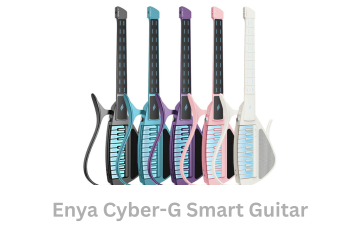When you’re learning guitar, calluses and chord shapes are the first hurdles to clear. Enter the Pocket Guitar Chord Practice Tool—a diminutive, six-fret neck that fits in your hand yet carries more than 400 chord fingerings in its electronic memory. With a rotatable screen that lights up every chord diagram, this portable trainer promises to turn couch-time fiddling into a structured practice session. But does it live up to its hype? Let’s explore its design, performance, pros and cons, and ultimately whether it deserves a place in your practice routine.
Clever Design for On-the-Go Practice
At first glance, the device looks like half a guitar neck, molded from lightweight plastic and capped with a small, battery-powered LCD screen. The “strings”—thin, non-removable wires—aren’t meant to resonate but to provide a tactile surface for your fingertips. Below the screen, a rotating knob lets you flip through chord categories (major, minor, seventh, barre, and more), while simple up/down buttons cycle between individual chords. Three AAA batteries tuck into a compartment directly behind the display, powering the entire unit for roughly 10–15 hours of use.
- Six Frets, Six Strings: The tool replicates just the first half-dozen frets of a guitar, but that’s where most basic chord shapes live. It’s ideal for building muscle memory and calluses without hauling your full instrument to every café, bus stop, or living-room jam.
- Rotatable Chord Chart: Twist the screen module 180°, and the chord diagram flips—perfect for left-handed players. The chart displays fretboard graphics with numbered dots for finger placement, so you’re never guessing which finger goes where.
- Preloaded Wisdom: With over 400 chords stored inside, you’ll find everything from simple open majors to complex jazz inversions. The menu groups chords logically, reducing the time you spend hunting for that elusive D-m7♭5.
Building Calluses, Not Calluses of Confusion
Using the Pocket Tool is intuitive: select your chord, press the “play” button, and a tiny LED lights up the diagram. Press down on the corresponding string wires, and you’ll feel a soft click under each fingertip. While the “strings” won’t produce tone, the feedback is enough to forge fingertip toughness. Within days of regular use—five to ten minutes per session—my fingertips grew tougher, and my barre-chord pressure became steadier.
However, some quirks can trip up newcomers:
- String Tension: Because the wires serve only as finger-sensing contacts, tension is minimal. If you press too hard, the chord wires can bend or even snap, so a gentle touch pays off.
- Fret Spacing: The tool’s fret markers aren’t an exact match to a full-sized guitar. I found some finger stretches felt slightly off, especially for barre chord shapes. It’s a minor adjustment, but one to be aware of if you switch back and forth between this trainer and your real guitar.
- Instruction Clarity: The printed manual arrives in basic English, occasionally requiring a moment’s head-scratch. Fortunately, the device’s controls are straightforward enough that you’ll quickly move beyond the instruction page.
Who Stands to Gain the Most?
While the Pocket Practice Tool won’t replicate the resonance of an acoustic or electric guitar, it shines as a supplementary tutor and warm-up device. It appeals to several types of players:
- Absolute Beginners: If you’ve never formed a major chord before, the illuminated chord guides will eliminate guesswork and keep frustration at bay.
- On-the-Road Players: Traveling musicians who avoid airport security’s scrutiny of instrument pickups can sneak in a quick practice without raising eyebrows.
- Busy Hobbyists: Fitting in even five minutes of chord practice between coffee breaks becomes effortless when the tool lives in your backpack or desk drawer.
- Callus-Seekers: Those who dread raw fingertips will appreciate conditioning their skin gradually, rather than diving straight into barre-chord brutality on a full-sized neck.
Beyond the Basics: When Not to Rely on It
Despite its strengths, this pocket gadget has limits. If you’re preparing for a gig or need to build speed across all six strings with proper string tension, you’ll still want your full-sized guitar. Chord transitions practiced on the Pocket Tool won’t perfectly mirror live playing dynamics—your pinky might overextend or understretch when you return to real strings. Think of it as a training wheel, not a replacement for the real thing.
Pros and Cons at a Glance
Pros
- Ultra-Portable: Fits in a coat pocket, backpack, or glove compartment.
- Intuitive Chord Display: Over 400 chord shapes at your fingertips.
- Battery-Powered Simplicity: No amplifier, tuning, or cables required.
- Adjustable for Lefties: Rotatable screen handles both right- and left-handed players.
- Tactile Feedback: Strings click under your fingers to simulate callus-building.
Cons
- Non-Resonant “Strings”: No real sound—strictly a tactile trainer.
- Limited Tension: Wires can bend or snap if pressed too hard.
- Approximate Fret Spacing: Slightly different feel from a standard guitar neck.
- Basic Instructions: Manual may require a second look to decipher.
Timing Your Purchase: When to Pick One Up
- Prior to Lessons: Grab one before your first guitar class to ease into chord shapes.
- Before Travel: Toss it in your carry-on for practice during layovers or long drives.
- During Break Season: Take advantage of holiday downtime to build a finger-strength foundation.
- As a Gift: For a budding guitarist without space for a full instrument, it’s a thoughtful and affordable introduction.
Final Thoughts: A Handy Companion, Not a Complete Substitute
The Pocket Guitar Chord Practice Tool isn’t a magic bullet, but it is an ingenious stopgap for finger conditioning and chord memorization. Its clear visual guidance and portable design make it perfect for those stolen practice moments where lugging a guitar just isn’t practical. If you set realistic expectations—using it as a supplemental trainer rather than your main instrument—it can play a powerful role in accelerating early-stage learning and keeping your fingertips battle-ready. For beginners, travelers, or any guitarist looking to squeeze in extra practice without the bulk of a full-sized neck, this pocket-sized trainer just might be the perfect chord companion.
promaxoffers.online is a participant in the Amazon Services LLC Associates Program, an affiliate advertising program designed to provide a means for websites to earn advertising fees by advertising and linking to Amazon.com and other Amazon properties.
As an Amazon Associate, we earn from qualifying purchases. This means that some of the links on this site are affiliate links, and if you click on them and make a purchase, we may earn a small commission at no additional cost to you.
We only recommend products and services that we believe will provide value to our visitors. All opinions expressed here are our own.




0 Comments